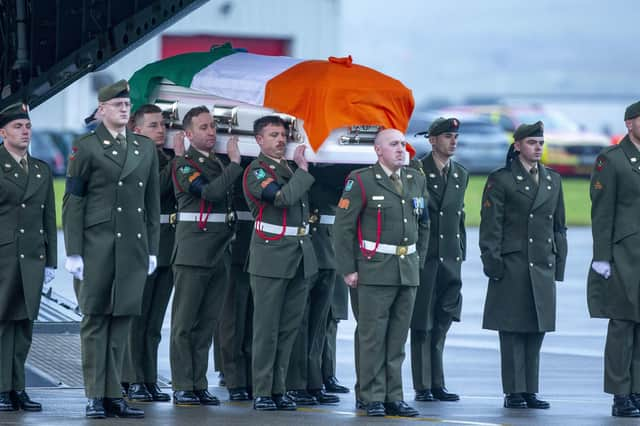Body of Irish peacekeeper Private Sean Rooney who was killed in Lebanon is repatriated to Ireland


UUP leader Doug Beattie, himself a former soldier described it as a sad day for the United Nations Interim Force In Lebanon and an emotional day for the Irish Defence Forces
He added: “My thoughts with them all and with family and friends as Pte Seán Rooney begins his journey home.”
Advertisement
Hide AdAdvertisement
Hide AdIrish foreign minister Simon Coveney said it was a “heartbreaking reminder of the patriotism, courage and sacrifice of our Defence Forces”.
Mayor of Derry City and Strabane Councillor Sandra Duffy said: “Everyone in the North West is thinking of Sean’s family and the wider community in Newtowncunningham (in Co Donegal) where he was well known.”
Private Rooney was killed on active service when his convoy came under attack in Lebanon last week.
The 23-year-old's remains left Beirut Airport on an Irish Air Corps Casa plane on Sunday afternoon after a solemn UN ceremony was held to honour the soldier ahead of his journey home.
Advertisement
Hide AdAdvertisement
Hide AdHe was accompanied on the flight by a number of his colleagues from 121 Infantry Battalion, including his company commander.
Pte Rooney's body arrived at Casement Aerodrome, Baldonnel, on the outskirts of Dublin on Monday morning.
A short prayer service was held after his body was returned to his family, who were given some private time with his remains.
His mother, his fiancee, his mother's partner, his three uncles and his grandfather were among those present as his coffin was carried from the aircraft.
Advertisement
Hide AdAdvertisement
Hide AdTanaiste and Minister for Foreign Affairs and Defence Micheal Martin also attended on Monday morning.
The white coffin, draped in an Irish tricolour, was carried by a number of pall bearers and was driven away in a hearse accompanied by a Garda escort shortly afterwards.
Pte Rooney's colleague, Private Shane Kearney, from Killeagh, Co Cork, was seriously injured in the incident and remains in a serious condition in hospital.
Two other peacekeepers were treated for minor injuries.
The soldiers were part of 121st Infantry Battalion, comprising 333 Irish troops, which was deployed in November to south Lebanon as part of the United Nations Interim Force in Lebanon (Unifil).
Advertisement
Hide AdAdvertisement
Hide AdOn Sunday, Taoiseach Leo Varadkar reiterated his condolences to Pte Rooney's family and friends and colleagues in the Defence Forces.
He said it is important to understand the circumstances of the attack.
Three investigations are under way: one led by the UN, another by the Defence Forces and a third by the Lebanese government.
Mr Varadkar said: "I would have confidence in those investigations to find out exactly what happened, why an Irish soldier lost his life and another was severely injured.
Advertisement
Hide AdAdvertisement
Hide Ad"It's important that we do that. It's also important that we avoid any speculation, I think, at this point until those investigations are done.
"But the main thing, I think, this week really is to stand with and express our condolences to Private Rooney's family, his friends and colleagues because it's been a long time since we lost a soldier in combat in Lebanon. But it does remind us how important that mission is."
Mr Varadkar said the Irish peacekeeping soldiers' efforts have allowed people "in that part of Lebanon for the last few decades to lead a relatively normal life, which wouldn't be the case otherwise".
"It's an immensely valuable mission - over 40,000 Irish people have served there, which is extraordinary if you think about it - and one that we're very committed to," the Taoiseach added.